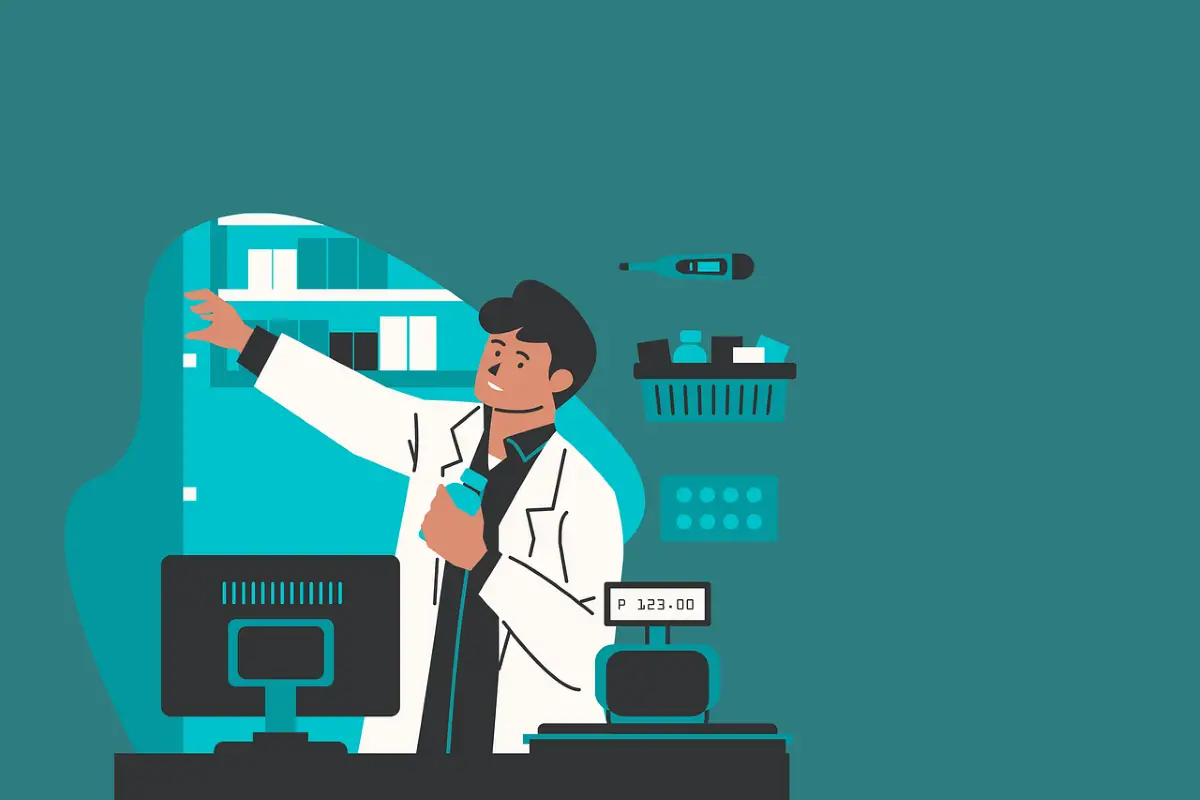Pharmacists and doctors can be hard to tell apart. They both wear white coats and may consult with patients as well. As such, many people can make mistakes between the two and end up in embarrassing situations. Are pharmacists doctors? Or are they different fields of work together?
Pharmacists hold the title of ‘doctor’ in the US, although they may not do the same work as medical doctors. Medical doctors focus on treating patients and performing medical procedures, while pharmacists focus on medication and dispensing drugs. Medical doctors and pharmacists also study for different degrees.
This article explores if pharmacists are doctors and if pharmacists do the same work as doctors. We also explore which field of work is harder to qualify for and if pharmacists earn more than doctors or vice versa.
What Do Pharmacists Do?
Pharmacists are professional medical workers who focus on dispensing and managing drugs and medication for patients. Pharmacists also ensure that drugs are issued safely and rationally, educate patients on the drugs, and also counsel patients. Some specialized pharmacists may also prescribe drugs.
Pharmacists play one of the most important roles in any healthcare system, together with doctors, nurses, and many more. Pharmacists perform roles related to the management of drugs and medication.
This means they tend to be behind medication racks instead of being upfront, talking to patients, and performing medical procedures and surgeries. Pharmacists generally work to support medical doctors in the following:
Dispensing Drugs And Vaccines
Pharmacists usually support medical doctors in assessing medical prescriptions. When a doctor writes a prescription, patients take it to the pharmacy, and pharmacists will then dispense the medication as written in the prescription.
A pharmacist may use his judgment to ensure a suitable amount of medication is dispensed. He may also advise the patient on the safety, efficacy, and quality of the drugs the patient is consuming.
Pharmacists used to not be allowed to immunize. In the 90s, only several states allow pharmacists to vaccinate. However, 50 states allow pharmacists to conduct vaccination work.
Promoting Safe And Rational Drug Use
Another major role of a pharmacist is to ensure rational and safe drug use. Pharmacists do this by ensuring medications are prepared most safely and that the formulations used to make the drugs are as accurate as possible.
Pharmacists also observe and work with drug companies to ensure drugs are safe and dispensed correctly to patients. For example, pharmacists will deny dispensing drugs to patients that do not have the conditions that require the drug.
Pharmacists also ensure drugs are safely and rationally consumed by educating patients on the drug. This is usually done through counseling and creating educational materials to support patients.
Finally, pharmacists keep themselves updated on new information, progress, and development of drugs, to ensure they can advise doctors on the best drug for patients.
Patient Counseling
Pharmacists also spend their time working with patients on the drugs they are using. Pharmacists educate patients on the drug they are using, as well as advise patients on how to properly consume the drug to enhance the therapeutic effects of the drugs their patients.
They also keep records of the administration of the drug to the patients. This is usually done through drug cards. This may allow the pharmacist or doctors to have a record of observing a patient’s response to the drugs and adjust accordingly.
You may like this article: Does Urine Hold DNA?
What Do Doctors Do?
Doctors are perhaps the most important role in a medical system. This is because doctors are the lynchpin of it. Doctors provide services to help patients maintain good physical and mental health.
This means doctors may be performing a front-facing role, meeting patients, diagnosing conditions, and prescribing medications to patients. Doctors may also be trained to perform specific medical procedures, such as surgeries.
Doctors may do the following in their daily work:
Diagnosing Symptoms To Determine Medical Condition
One of the doctors’ more important jobs is to meet patients and work with them to determine any medical condition. This is commonly done in several ways, examination, testing, and conversation.
A doctor may begin by chatting with the patient about what is wrong. Subject to the information received, a doctor may conduct a physical examination to confirm if there are any medical issues.
The doctor may also order further examinations, such as lab tests, to ensure and confirm his findings. Samples such as saliva, blood, urine, or feces may be taken to facilitate this.
Prescribing Medication
Once the medical condition has been approved, a doctor can see if there are suitable medications for the patient. A doctor then writes a prescription, which the patient can then take to the pharmacist to fill.
A doctor usually prescribes medication in suitable, rational, and manageable doses for the patient. This is usually done by observing the severity of the symptoms and the patient’s physical condition.
Performing Medical Procedures
Doctors may also perform medical procedures to help patients with medical conditions, subject to training. A doctor’s most common procedures on a patient may involve injection and minor surgery.
However, a doctor may be unable to perform more specialized procedures, as a specialized doctor may be needed. For example, a regular doctor may diagnose a heart condition but may not be able to perform surgery to fix the heart problem. In this case, he will refer the patient to a cardiac surgeon.
Working With Other Professionals To Care For Patients
A doctor in a hospital setting may need to work with other medical professionals to care for patients. These include pharmacists, nurses, therapists, and other supporting medical roles.
A doctor likely works with them by sending patients to perform procedures (physical therapist), to take medications (pharmacists), or many more. Doctors may also consult these supportive roles on patients’ conditions to decide further action.
Staying Up-To-Date With Emerging Medical Improvements
Finally, medical doctors stay updated with emerging medical improvements to ensure they can provide their patients with the best medical treatments possible.
This is commonly done by reading medical journals or attending medical conferences. Doctors may also work with other medical professionals, such as pharmacists, to learn about new drugs or procedures.
Are Pharmacists Doctors?
Pharmacists and doctors may or may not be the same. They do not do the same job but may share similar titles. Medical doctors focus on treating patients and performing medical procedures, while pharmacists focus on dispensing drugs. Both may be called ‘Doctor’ and can carry Dr. in front of their surname.
You can look at it from two different viewpoints to answer the question if a pharmacist is also a doctor. One looks at their scope of work, while the other looks at their ability to carry the title ‘Dr.’
Do Pharmacists And Doctors Do The Same Job?
Pharmacists and doctors do not do the same job in the first part. A medical doctor focuses more on diagnosing a patient’s condition. The doctor prescribes medicines or performs medical procedures to support the patient.
A doctor may also forward the patient to a medical specialist if he needs to. This usually happens when the patient shows possible issues beyond his ability.
Pharmacists tend to be less front-facing than doctors but are more supportive. Pharmacists usually help to administer and dispense drugs to patients. They also work with the patient to ensure they use the drugs correctly.
The most common way pharmacists and doctors work together is for the pharmacists to receive a doctor’s prescription and then dispense the drugs. The pharmacist will then advise the patient on how to take the drugs, as well as on how to handle the side effects that may appear.
You can roughly say that a pharmacist generally supports the medical doctor in treating a patient, focusing on administering and dispensing medication to patients. This also means that when it comes to job scope, pharmacists are not doctors, and doctors are not pharmacists.
Can Pharmacists Use The Title ‘Dr.’?
You certainly address a medical doctor as a ‘doctor,’ and they carry their ‘Dr.’ title in front of their surname. But with pharmacists, it may be less clear-cut.
This is because some pharmacists can use the title ‘Dr.’ while some cannot. Before this, a person only needed a bachelor’s degree in pharmacy to dispense medications and work as a pharmacist. However, a new law was passed in 2004, requiring a pharmacist to have a Doctor of Pharmacy degree.
A Doctor of Pharmacy degree usually requires six years of study. Once graduated, the person may practice as a pharmacist and use the title ‘Dr.’
If you see the initial ‘Pharm.D’ behind their name, you may address them as ‘doctor,’ with their surname following. This also means that pharmacists without the Doctor of Pharmacy degree may not use the title ‘Dr.’
As such, not all pharmacists are doctors when it comes to their titles.
Is It Harder To Become A Pharmacist Than A Doctor?
Becoming a pharmacist or a medical doctor is hard. However, if you decide between the two, a pharmacy degree may be easier to complete than a medical study. However, practicing medicine or pharmacy requires years of study and training and is only for serious and committed individuals.
Generally, studying to become a pharmacist and a doctor may be one of the hardest studies you may undertake. Both are one of the hardest degrees you could earn from a university and will require years of study, hard work, and commitment.
However, comparing the two makes it possible to say that becoming a pharmacist may be easier.
To practice pharmacy in the United States, you must possess a Doctor of Pharmacy degree. The shortest possible time to earn this degree straight out of high school may take around six years. Only six universities in the US offer such direct routes, which means competition will be fierce.
For other universities, you first study for a related bachelor’s degree before going into pharmacy school for four years to earn your PharmD. Once you earn your degree, you sit for the North American Pharmacist Licensure Exam (NAPLEX). Once you pass, you are good to practice pharmacy. This route will take you at least eight years.
To practice as a doctor, you must hold a Doctor of Medicine degree and pass examinations with the United States Medical Licensing Exams (USMLE).
From high school, your journey would likely start with attending a university for four years to earn a bachelor’s degree. All degrees are ok, although most aspiring doctors take life science-related subjects to further qualify for medical school later. These subjects include physics, chemistry, biology, anatomy, and more.
You will then sit and pass the MCAT test. MCAT stands for Medical College Admission Test, which helps universities to assess your suitability to become a doctor or a medical student. You need to pass the MCAT to enter any medical school.
Once passed, you apply to medical schools in universities for a Doctor of Medicine (MD) program. If accepted, it should take four years to complete if you do not fail papers or procrastinate.
When you finally graduate with an MD, you now can go to the next step, which is to complete your residency program. This will take you 3-7 years, and you will spend time shadowing and working with practicing doctors and learning your way. You will be paid a salary and perform doctoral work, but you are not a doctor yet.
Finally, once you have passed residency, you can apply for a license from the USMLE. You can only become a full practicing doctor once you receive your practicing license from the USMLE.
Do Doctors Earn More Than Pharmacists?
Doctors do earn more than pharmacists. The median salary for a medical doctor is about $246,600 in the United States, while pharmacists earn around $145,500. This makes sense considering the difficulty and longer time needed to become a doctor than a pharmacist.
In the United States, doctors do earn more on average than pharmacists. Salary.com reported that the median salary for a pharmacist is around $145,500 a year, while for a medical doctor, the amount is $246,600 a year.
The earning potential is also wide. A medical doctor may earn up to $309,072 annually if he is within the top 10% of earners. The top 10% pay range for a pharmacist would be around $163,645 a year.
This means doctors earn more in general and can earn much more than a pharmacist. Suppose the doctor continues his study and specializes in a specific field of medicine, such as cardiology, oncology, or more. In that case, the income may be even higher.
The wage gap may be surprising, but when you think deeper about it, it may make sense in many ways. First, it generally takes much longer to complete the study to become a licensed doctor.
From undergraduate degree to medical school, residency, and passing licensing, you may look at at least 12 years or even more years of studying and learning. This is on top of having to sit for major exams, the MCAT and the USMLE
Compare that to becoming a pharmacist, which may take about 8 years at least to complete, and only one major exam, the NAPLEX.
Plus, working as a medical doctor may carry more responsibilities and liabilities since you make more decisions and are much more involved with the patients. This means the doctor may be the first to get sued if there is a misdiagnosis or mistakes in medical procedures.
Pharmacists may also have liabilities, but they generally have fewer since they tend to follow doctors’ prescriptions when dispensing drugs. The possible liability from a pharmacist’s case would be dispensing the wrong drugs, giving patients the wrong advice, etc.
Another point to consider is that generally, there are more pharmacists than medical doctors, which means the market demand for doctors may be higher. As a result, hospitals or other employers are willing to pay more to hire medical doctors than pharmacists.
Conclusion
Pharmacists are licensed healthcare professionals with responsibilities that include determining the safest and most important medications for each patient; unlike doctors, pharmacists generally do not treat patients, nor can they prescriptions for controlled substances. The confusion between pharmacists have been called upon to serve as physicians’ sidekicks, particularly during the flu season. Finally, we note that for those who are looking for work in this area, open vacancies work from home pharmacist can view the site on Jooble.
 Being Human
Being Human





